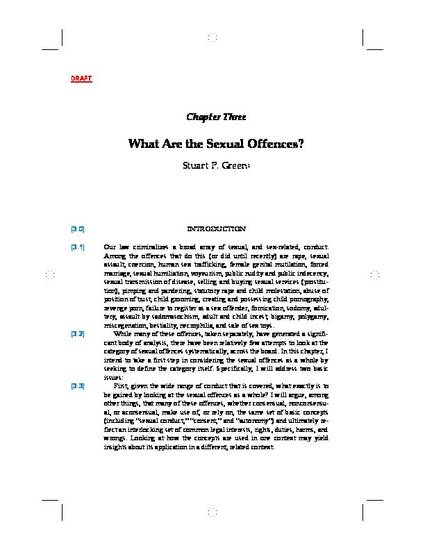
Contribution to Book
What are the Sexual Offences?
The New Philosophy of Criminal Law
(2015)
Abstract
Our law criminalizes a broad array of sexual, and sex-related, conduct. Among the offences that do this (or did until recently) are rape, sexual assault, coercion, human sex trafficking, female genital mutilation, forced marriage, sexual humiliation, voyeurism, public nudity and public indecency, sexual transmission of disease, selling and buying sexual services (prostitution), pimping and pandering, statutory rape and child molestation, abuse of position of trust, child grooming, creating and possessing child pornography, revenge porn, failure to register as a sex offender, fornication, sodomy, adultery, assault by sadomasochism, adult and child incest, bigamy, polygamy, miscegenation, bestiality, necrophilia, and sale of sex toys.
While many of these offences, taken separately, have generated a significant body of analysis, there have been relatively few attempts to look at the category of sexual offences systematically, across the board. In this chapter (from The New Philosophy of Criminal Law, edited by Chad Flanders and Zach Hoskins), I intend to take a first step in considering the sexual offences as a whole by seeking to define the category itself. Specifically, I will address two basic issues:
First, given the wide range of conduct that is covered, what exactly is to be gained by looking at the sexual offences as a whole? I will argue, among other things, that many of these offences, whether consensual, nonconsensual, or aconsensual, make use of, or rely on, the same set of basic concepts (including “sexual conduct,” “consent,” and “autonomy”) and ultimately reflect an interlocking set of common legal interests, rights, duties, harms, and wrongs. Looking at how the concepts are used in one context may yield insights about its application in a different, related context.
Second, what, if anything, distinguishes the sexual offences from other kinds of criminal offences? I will argue that there is no one set of necessary and sufficient conditions that defines the category and thereby distinguishes sex crimes from other kinds of crime. Rather, we need to look to several overlapping forms of prohibitions: on one or more kinds of socially disfavoured sexual acts; on conduct that is presumed to be preparatory of, or conducive to, future (illicit) sexual acts; and on conduct that, though it does not involve sex as such, nevertheless infringes on some aspect of another’s right to sexual autonomy. Part of the challenge here will be to say what it means for conduct to be “sexual” and what distinguishes sexual autonomy from other forms of autonomy.
Keywords
- sex,
- sexual offenses,
- classification of crime
Disciplines
Publication Date
2015
Editor
Chad Flanders and Zach Hoskins
Publisher
Rowman and Littlefield
Citation Information
Stuart Green. "What are the Sexual Offences?" The New Philosophy of Criminal Law (2015) Available at: http://works.bepress.com/stuart_green/12/
